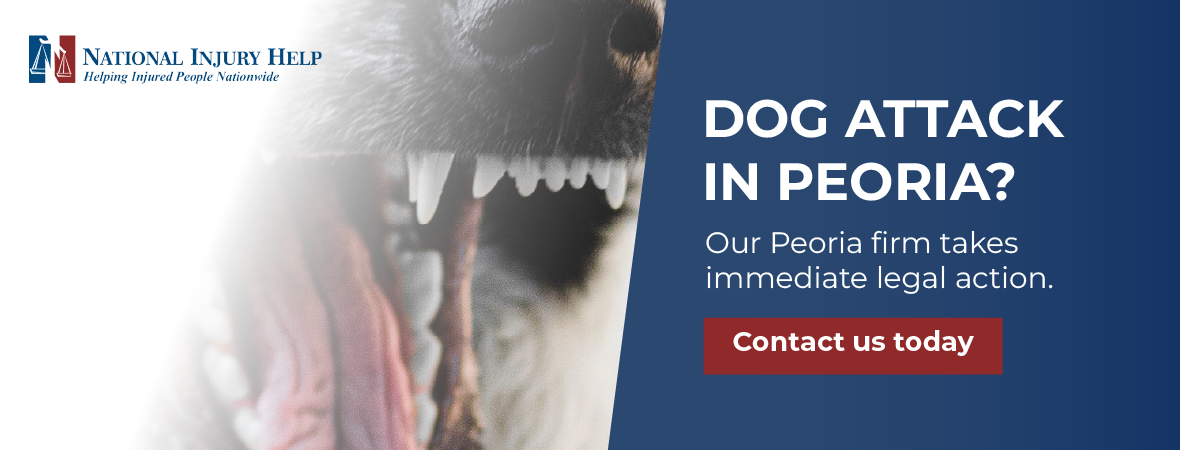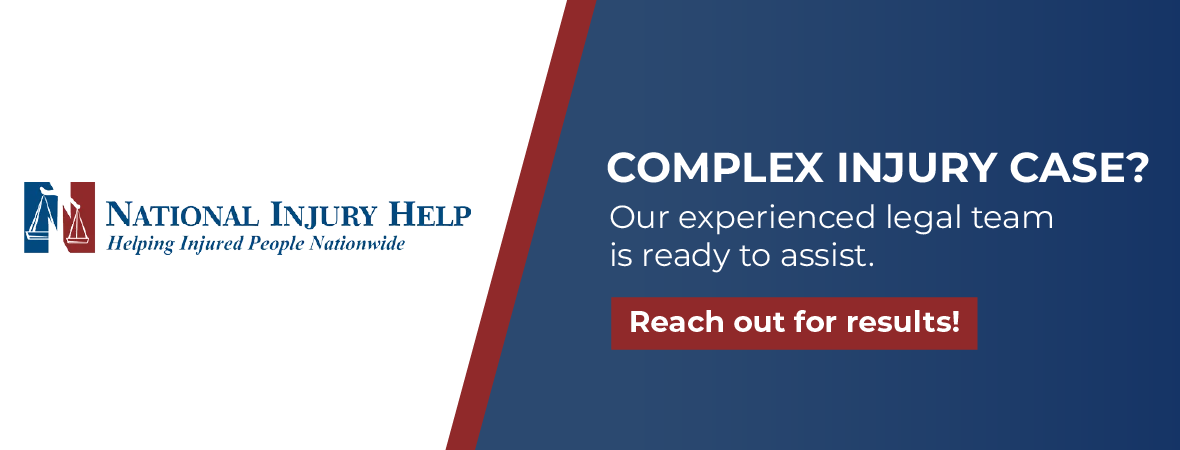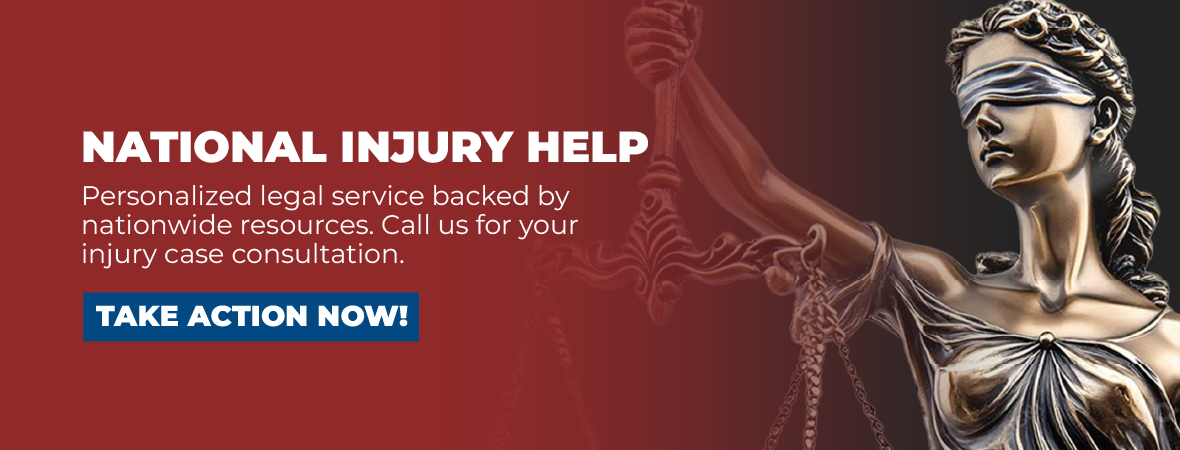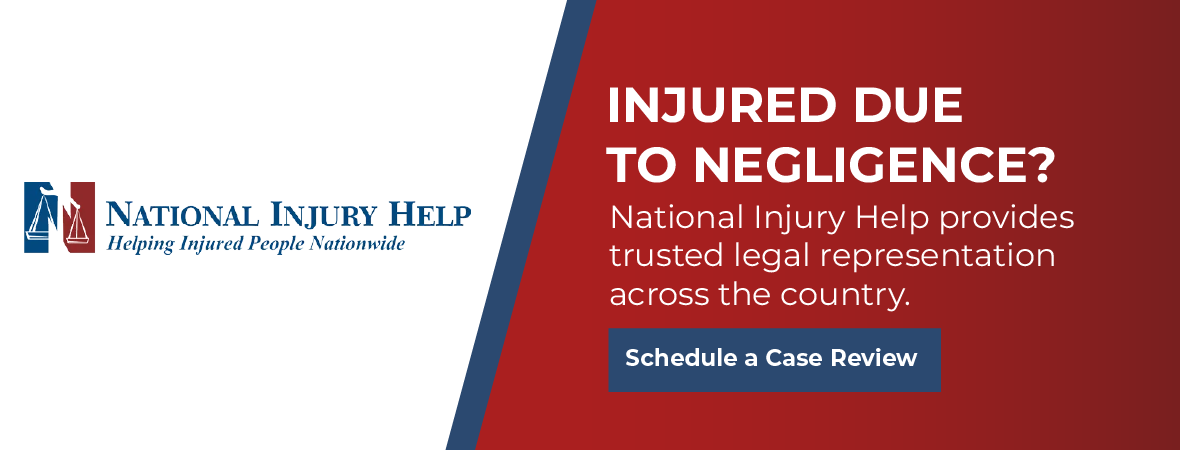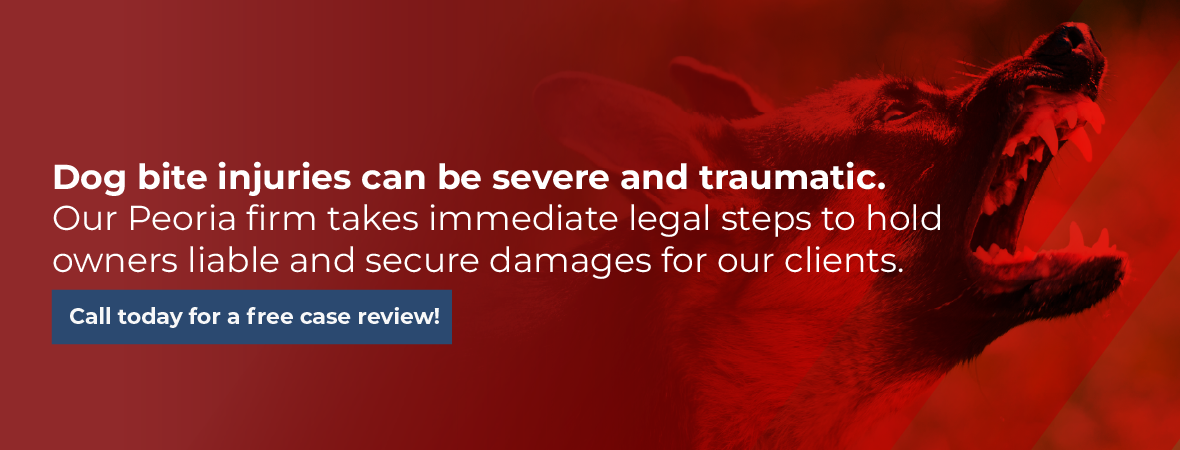Dog bites in Peoria can cause serious injuries, infections, and emotional trauma. Contact our team of National Injury Help today by calling 1 (800) 214-1010.
Walking through a quiet Peoria neighborhood or spending a sunny afternoon at Rio Vista Park should never end with an urgent care visit and stitches. Unfortunately, dog bites happen here more often than many people realize, and they leave both physical and emotional wounds that linger.
When teeth puncture skin, the pain is immediate, but the financial and mental toll shows up later in hospital invoices, missed paychecks, and sudden anxiety every time a dog barks in the distance. The good news is that Arizona law takes dog bites seriously and gives victims powerful rights to seek compensation.
We are here to hold the dog owner accountable and fight for the compensation you deserve.
Dog Bite Laws in Arizona: What Peoria Residents Should Know
Before anyone can seek fair compensation, it helps to understand the rules that favor bite victims in this state. The next few paragraphs outline those rules in everyday language.
Strict Liability Statute
Arizona Revised Statutes section 11-1025 says that a dog owner is liable for any injury their dog causes by biting. The owner cannot escape responsibility by claiming the dog was normally friendly or had never shown aggression. Strict liability removes the need to prove negligence. In plain terms, if a dog bites someone, the owner pays.
Where the Bite Occurs Matters
The statute covers bites that happen in public areas such as parks, sidewalks, and apartment common spaces. It also covers bites on private property when the victim is there legally.
That could include delivering a package, visiting a friend, or reading a meter. If you had permission to be on the property when the dog attacked, strict liability still applies.
One-Bite Rule Does Not Apply in Arizona
Some states give dog owners a free pass the first time their dog bites, saying the owner could not have known the animal was dangerous. Arizona rejects that idea. Owners are responsible from the moment they choose to keep a dog on the premises, and they remain responsible even if the dog has never grownl.
Criminal Versus Civil Responsibility
Police or animal control officers may issue fines or citations after a bite. Those penalties go to the state or the city, not to the victim. To recover medical costs and other damages, the injured person must file a civil claim. A lawsuit is separate from any criminal action and focuses on paying the victim rather than punishing the owner.
Peoria Dog Bite Lawyer’s Guide for What To Do Immediately After a Dog Bite in Peoria
A calm, step-by-step response gives you the best chance of a full physical and financial recovery.
Get Medical Help
Even a small puncture can hide bacteria deep under the skin. Visit an emergency room or urgent care center as soon as possible. Doctors will clean the wound, update tetanus shots, and decide whether you need rabies prophylaxis. Quick treatment reduces infection risk and creates medical records that link the injury directly to the bite.
Identify the Dog and Owner
Ask for the owner’s name, phone number, and home address. If the owner is not present, try to take a photo of the dog or ask witnesses who the dog belongs to. Find out if the animal is current on rabies vaccinations. This information guides medical decisions and starts the insurance process.
File an Official Report
Contact Peoria Animal Control or Maricopa County Animal Care and Control to report the incident. Officers will document the bite, verify vaccination records, and may quarantine the dog if necessary. Their report becomes powerful evidence in any civil claim.
Document the Incident
Use your phone or ask a friend to photograph the wound, torn clothing, the location of the attack, and the dog, if it is safe to do so. Keep the clothing you wore unwashed in a plastic bag. Collect names and phone numbers of anyone who saw the attack. Save every medical bill, prescription, and discharge summary.
Avoid Speaking With the Dog Owner’s Insurance
An adjuster might call within days, sounding friendly and concerned. Remember that the adjuster’s goal is to save money for the company, not to help you. Do not give recorded statements or sign any papers until you talk to a lawyer.
Common Injuries and Complications From Dog Bites
Dog bites go far beyond the initial pain. These injuries can cause deep wounds, infections, and long-term physical and emotional damage. Many complications surface long after the wound appears healed. Knowing what to expect can help you seek care quickly and hold those responsible accountable.
1. Puncture Wounds and Lacerations
Dog bites often look superficial, but they can be deadly serious beneath the surface.
Deep Puncture Wounds
A dog’s teeth are sharp and narrow. A single puncture appears small at first, but it can go deep into muscle or tendon tissue. Because the puncture is narrow, it closes quickly, trapping dirt and bacteria inside. Hidden pockets of infection can develop below the skin, requiring long-term treatment.
Lacerations and Tearing
During an attack, dogs often clamp their jaws and shake their heads back and forth. This motion transforms punctures into ragged tears. These lacerations can cut nerves, tendons, or ligaments, damage that may not be visible at first. Without careful examination, severed nerves can lead to permanent numbness or loss of muscle control.
Medical Treatment
Many bites need more than stitches:
- Debridement to remove damaged tissue and prevent infection.
- Skin grafts when the bite removes large areas of skin.
- Reconstructive surgery for deep cuts that distort joints or facial structure.
Even after all this, scars often remain. Scarring can restrict skin flexibility and cause lasting discomfort.
2. Infections: Cellulitis, MRSA, and Rabies
When a dog’s teeth break your skin, bacteria enter your body. Infections can be immediate or delayed and present serious risks.
Common Bacterial Infections
Dog mouths carry hundreds of bacteria like Pasteurella, Staphylococcus, and Streptococcus. Once inside your body, these germs can cause:
- Cellulitis: red, swollen, painful skin that spreads quickly. Without treatment, it progresses into deeper tissue infections or sepsis.
- Sepsis: a serious infection where the blood clears infection but creates widespread inflammation, leading to organ failure.
MRSA and Drug-Resistant Bacteria
Methicillin-resistant Staphylococcus aureus (MRSA) can make a wound resistant to standard antibiotics. If that infection develops, the victim may require:
- Intravenous antibiotics, often administered in a hospital
- Long-term treatment, including weeks of nursing care
- Risk of limb loss or death, especially in older patients
Rabies Risk
Though rare in developed areas, rabies remains fatal without treatment. Once exposed to saliva, a person must receive a rabies vaccine series within 24 hours. If the dog is stray or its vaccination status is unknown, medical teams treat it as a possible rabies exposure, adding days of medication and preventive measures stress.
3. Facial Injuries
A child’s height often puts their face right in line with a dog’s mouth.
Complex Locations
Bites to the lips, cheeks, nose, or eyelids require much more work than standard wounds. Nerve endings are dense, and muscles are essential for expression and eye movement.
Long-Term Treatment
- Plastic surgery is often needed to repair delicate facial tissue.
- Multiple procedures may be required over time to improve alignment, reduce scarring, and restore symmetry.
- Functional therapy (speech therapy, eyelid exercises) can be essential for regaining lost function after nerve or flesh damage.
Emotional Trauma
Even after physical healing, many victims feel self-conscious about their appearance, especially as they age. Bullying, loss of confidence, and social isolation often follow.
4. Broken Bones and Crush Injuries
Dogs are strong animals, and as such, don’t just bite; they bite hard.
Bite Force and Crushing
Large breeds can apply more than 300 pounds of pressure. This bite alone can crush bones in the forearm, leg, or fingers. Crush injuries then compress blood vessels and nerves, causing swelling or loss of function.
Falls During the Attack
Victims often fall while trying to escape. Those falls can break wrists, hips, ankles, or lead to shoulder injuries. Compounded injuries require careful, often long-term, medical care.
Complex Healing
- Surgery: Many fractures need plates, pins, or screws.
- Rehabilitation: Physical therapy is often essential to restore movement and strength.
- Chronic pain: Some people continue to experience discomfort years after surgery.
Some cases require ongoing medical support and daily living help. Emotional cost and future earnings are impacted, which must be included in any legal compensation.
5. Psychological Trauma and Emotional Scars
Just as wounds take form on the skin, emotional wounds can remain hidden.
Post-Traumatic Stress Disorder (PTSD)
Victims often replay the attack in nightmares or relive the event multiple times. Symptoms may include:
- Recurring nightmares or flashbacks
- A sense of constant danger
- Night sweats, tremors, or panic attack symptoms
Anxiety and Avoidance
Many sufferers avoid dogs, parks, sidewalk travel, or even talking about the assault. These patterns interfere with quality of life, limit outdoor activity, and deteriorate mental health.
Depression
Prolonged treatment, disfigurement, and stress can trigger significant depression. Loss of independence and visible scarring deepen emotional trauma.
Recovery Requires Support
- Counseling or psychotherapy is essential to processing trauma.
- Medication may be needed for anxiety or depression.
- Therapy costs are long-term and often significant, but are vital and justifiable under compensation claims.
6. Loss of Function or Permanent Disability
Some dog bite victims never fully recover their function.
- Nerve Damage: Deep bites to hands, arms, or legs may cut nerves. Permanent numbness or limited mobility is common.
- Joint Damage: Crush injuries and deep puncture wounds can destroy joint surfaces. Osteoarthritis or joint fusion may result, requiring joint replacements later.
- Facial Nerve Injury: Lip and eyelid paralysis may become permanent, affecting speech or eye protection.
- Chronic Pain: Injury recovery can leave lingering nerve pain, amplified by even mild pressure or cold.
Compensation should reflect future limitations, assistive care needs, job changes, and quality-of-life loss.
7. Long-Term Medical Complexities
Just because your skin heals doesn’t mean the problem is gone.
- Scar management: Dermatologists may prescribe steroid creams or surgical revision.
- Physical therapy: Lifelong physical or occupational therapy may be necessary for mobility or strength.
- Pain management: Continued use of pain medication or nerve therapy often becomes part of life.
- Reconstructive surgeries: Some repairs require second or third procedures, creating ongoing medical costs.
Compensation must account for the long-term and future care, not just immediate needs.
8. Misdiagnosis and Delayed Treatment
Some injuries, especially internal ones, are not obvious early on.
Hidden Damage
Deep puncture wounds can penetrate muscles or internal organs without external signs. Without proper medical assessment, these injuries can lead to infection or necrosis.
Delayed Professional Care
Pain or swelling developing days after the attack might be misdiagnosed as soft tissue damage. By then, infections or nerve injuries may have worsened.
A doctor might originally dismiss the injury, only to discover serious complications later, affecting recovery and compounding emotional trauma.
Peoria Dog Bite Lawyer Explains Who Can Be Held Liable for a Dog Attack
More than one insurance policy can provide compensation, depending on the circumstances.
The Dog Owner
Under strict liability, the owner is the first and often the main party responsible. Homeowner or renter insurance typically covers dog bites, though some policies exclude certain breeds or require additional coverage.
Landlords or Property Managers
If a landlord knew a tenant’s dog was dangerous but allowed it to stay, the landlord may share responsibility. Evidence can include prior complaints, maintenance requests for broken fences, or emails warning management of aggressive behavior.
Business Owners or Event Hosts
When a bite occurs in a store, restaurant patio, or public event, the organizer may be liable for failing to enforce leash rules or for allowing animals in crowded spaces without proper barriers.
Dog Sitters or Handlers
Professional dog walkers, groomers, and boarding facilities assume custody and control of the animal. If their negligence, such as using a broken leash, leads to a bite, their business insurance may cover the claim.
Compensation an Experienced Peoria Dog Bite Lawyer Can Secure for Victims
A complete claim looks beyond emergency bills and addresses every way the injury changes life.
Medical Expenses
Compensation starts with ambulance rides, emergency room care, stitches, and rabies vaccines. It also covers follow-up visits, plastic surgery, physical therapy, prescriptions, and psychological counseling. Future treatments, such as scar revision surgery or tendon repair, are in demand when doctors provide cost estimates.
Lost Wages and Earning Capacity
Time off for doctor visits or recovery subtracts from paychecks. More serious injuries may prevent a return to previous employment. Economists compare past earnings with new limitations to calculate lost future income.
Pain and Suffering
Physical pain and emotional distress carry real value under Arizona law. A settlement can reflect sleepless nights, fear of dogs, and reduced enjoyment of hobbies like hiking or jogging.
Scarring and Disfigurement
Visible scars affect self-confidence and social interaction. Courts recognize the lasting impact of disfigurement, especially when a bite scars a child’s face or an adult’s hands.
Punitive Damages
If the owner acted with reckless disregard, perhaps by ordering the dog to attack or ignoring repeated warnings from animal control, the court may award punitive damages to punish that behavior and discourage others from similar negligence.
How a Peoria Dog Bite Lawyer Can Help You
Legal counsel eases stress, preserves evidence, and often increases final compensation.
Evaluate Your Claim
A lawyer starts with a free consultation, listens to your story, reviews medical records, and estimates the claim’s value based on past verdicts and settlements.
Investigate the Dog’s History
Attorneys request animal control records and interview neighbors to learn whether the dog has bitten before or shown aggression. Prior incidents strengthen the claim and may support punitive damages.
Handle All Communications and Negotiations
Insurance adjusters know every tactic to delay or devalue claims. Your lawyer answers all calls and letters, ensuring that you never face trick questions or pressure to settle early for less.
Gather Medical and Expert Testimony
Physical scars and psychological trauma demand expert explanation. Attorneys work with plastic surgeons, infectious disease specialists, and therapists to document future needs and their costs.
Represent You in Court if Needed
Most claims settle, yet some insurers refuse fair payment. A lawyer drafts the lawsuit, files it in Maricopa County Superior Court, and presents evidence to a jury when necessary.
Contact a Peoria Dog Bite Lawyer Today
A dog bite can cause serious injuries and leave emotional scars that last a lifetime. Medical bills, lost work time, and ongoing fear can add to the stress. If you or someone you love was bitten by a dog in Peoria, Arizona, now is the time to speak with a lawyer who understands what you are going through and knows how to help.
At National Injury Help, we take dog bite cases seriously. Whether the injury happened at a park, on a neighborhood walk, or in a friend’s yard, we will fight to get the compensation you need for medical care, missed wages, and emotional harm. Arizona law protects dog bite victims, but acting quickly helps secure strong evidence and ensures your case is handled properly from the start.
We offer free consultations, and you won’t have to pay anything out of pocket. Our legal fees are only applicable if we win your case. We work hard to relieve the pressure from you so that you can focus on healing.
When you call us, we will listen carefully to your story, answer your questions, and explain your legal options in clear, understandable terms. If we take your case, our team will begin investigating immediately to hold the dog’s owner accountable.
We proudly serve Peoria and the surrounding communities, including Glendale, Surprise, and Sun City. If you need assistance, we are here and ready to help.
Call 1 (800) 214-1010 today to speak with a local dog attack attorney in Peoria who will support you every step of the way.
Frequently Asked Questions (FAQ) for Dog Bite Victims in Peoria
What should I do immediately after a dog bite in Peoria?
First, get medical help right away, even for a small wound, to prevent infection and create a medical record. Then, try to identify the dog and its owner. You should also file an official report with Peoria Animal Control or Maricopa County Animal Care and Control, and document everything with photos of your injuries, the location, and any torn clothing. Avoid speaking with the dog owner’s insurance company until you have consulted with a lawyer.
Is the dog owner always responsible for a bite in Arizona?
Yes, in most cases. Arizona has a “strict liability” law (A.R.S. § 11-1025). This means a dog owner is liable for injuries caused by their dog biting someone, even if the dog has never been aggressive before. The “one-bite rule” that some states use does not apply in Arizona.
What if the bite happened on private property?
The strict liability law still applies if you were on the private property legally. This includes if you were a guest, a delivery person, or there for a lawful purpose like reading a meter. The key is that you had permission to be there.
What kind of compensation can I receive?
You may be able to recover compensation for medical expenses (including future surgeries or therapy), lost wages from missing work, pain and suffering, scarring or disfigurement, and even punitive damages if the owner’s actions were particularly reckless.
Who else can be held liable besides the dog owner?
Depending on the situation, other parties may share responsibility. This could include a landlord who knew a tenant had a dangerous dog but did nothing, a business owner who allowed an unleashed dog on their premises, or a dog sitter or walker whose negligence led to the attack.
What are common complications from dog bites that I should watch for?
Dog bites can lead to serious issues beyond the initial wound. These include deep infections like cellulitis or MRSA, nerve or tendon damage, broken bones from the force of the bite or a fall during the attack, and long-term psychological trauma such as PTSD, anxiety, or depression.
How long do I have to file a dog bite lawsuit in Arizona?
Arizona has a statute of limitations that sets a deadline for filing personal injury lawsuits. It is crucial to speak with an attorney as soon as possible to ensure you do not miss this important deadline.
How can a Peoria dog bite lawyer help me?
A lawyer can evaluate your claim for free, investigate the dog’s history, handle all communication with insurance companies to protect your rights, gather medical evidence and expert testimony to support your case, and represent you in court if a fair settlement cannot be reached.
What does it cost to hire a lawyer from National Injury Help?
We offer free consultations. Our firm works on a contingency fee basis, which means you pay no upfront fees or out-of-pocket costs. Our legal fees are only paid if we successfully recover compensation for you.





